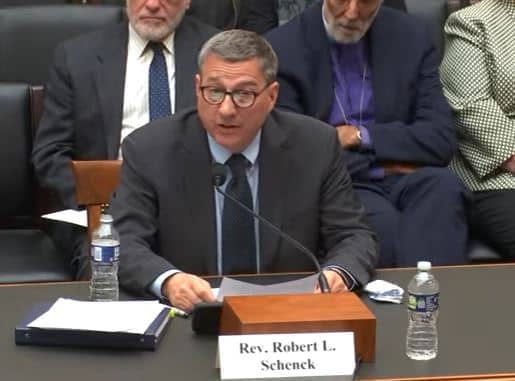Minister Says He Successfully Lobbied Supreme Court Justices for His Causes

WASHINGTON — An evangelical minister who on Thursday claimed to be a whistleblower on conflicts of interest at the Supreme Court told Congress that for years he recruited “stealth missionaries” to advocate conservative causes to the justices.
The wealthy couples Robert L. Schenck said he used to win influence met some of their greatest success with Justices Clarence Thomas and Samuel Alito.
“Our overarching goals were to gain insight into the conservative justices’ thinking and to shore up their resolve to render solid, unapologetic opinions,” Schenck told the House Judiciary Committee.
Democrats on the committee used the hearing to say Schenck’s testimony showed the need for Congress to impose a new code of conduct on the Supreme Court.
Conservative lawmakers, as well as a lawyer who testified during the hearing, responded by calling Schenck a “liar” or saying he engaged in “gossip” and “hearsay” as he tried to win attention that might result in more donations to his nonprofit group.
Schenck is president and founder of the Dietrich Bonhoeffer Institute, a Christian public advocacy organization that hosts discussions on political issues among clergy, politicians and other institution leaders.
From 1995 to 2018, Schenck led Faith and Action, a group that organized 20 meetings between his “stealth missionaries” and conservative Supreme Court Justices Thomas, Alito and Antonin Scalia.
In July 2022, Schenck revealed in media interviews that he coached the wealthy couples to subtly advocate against abortion before the justices. They would arrange the meetings using tactics such as donations to the Supreme Court Historical Society.
“That proved to be very effective,” Schenck said Thursday.
On one occasion, Schenck said he learned about the 2014 Burwell v. Hobby Lobby Stores ruling before it was announced when Alito leaked it to two of his colleagues during a private dinner at the justice’s home.
The Hobby Lobby decision allowed corporations to be exempt from regulations for religious reasons if government agencies could use less restrictive means of enforcing laws. Much of the concern in the case focused on whether employers must supply employees with contraceptives as a required health benefit.
The colleagues, Gayle and Don Wright, as well as Alito, deny Schenck’s allegation of the leaked ruling.
On another occasion, Schenck said Thomas told him, “Keep up what you’re doing. It’s making a difference.”
He denied motives of personal gain for his whistleblower testimony.
“I felt as though it was a moral obligation,” Schenck said.
Mark Paoletta, a lawyer who has represented Thomas’ wife and knows the justice, said Schenck’s lobbying efforts had “zero impact” on the Supreme Court.
“Mr. Schenck rewrites history to suit his needs,” Paoletta said.
Rep. Thomas McClintock, R-Calif., said, “There is nothing, nothing to support his claims.”
Democrats pressed ahead with their assertions that Schenck’s testimony shows the need for a bill they approved in May to institute a new Supreme Court code of conduct. The Supreme Court is exempt from the code of conduct for judges in lower courts.
The bill would require Supreme Court justices to publicly disclose all gifts and income they receive. It would set stricter standards for them to recuse themselves from cases that might represent a conflict of interest.
It is awaiting a vote in the full House. A companion bill is pending in the Senate.
“The [Supreme] Court either cannot or will not do what is in its best interest, therefore the Congress must step in,” said Rep. Hank Johnson, D-Ga. “The answer here is not revolutionary, it is to impose a code of ethics.”
Rep. Pramila Jayapal, D-Wash., said, “The Supreme Court is long overdue for a more ethical code of conduct.”
Tom can be reached at [email protected] and @TomRamstack






















